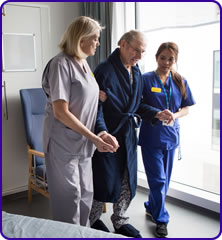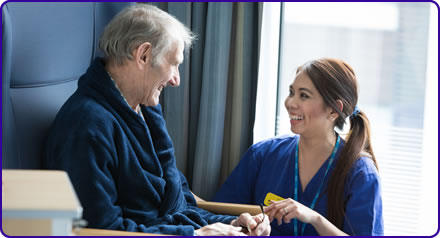Endourology

After clinical review, our expert stone surgeons suggest management plans that are individually tailored to you, the patient. Management decisions are typically based upon stone factors (type, size and location), kidney factors (number, function, previous surgery) and patient factors (other illnesses or factors that may make surgical intervention higher risk).
The stone services offered through the specialist stone unit includes:
Onsite extra-corporeal shockwave lithotripsy (ESWL)
This treatment uses machine generated shock waves to break up urinary stones. The treatment sessions are carried out as daycase procedures and last for approximately 30 minutes. You should be sent home within 2-4 hours. The stone unit has an onsite lithotripter and a dedicated lithotripsy team who meet weekly to plan stone treatments. We offer an emergency shock wave lithotripsy service and are involved in national trials in stone treatment.
Uretero-renoscopy and laser lithotripsy
This treatment is carried out under a general anaesthetic and involves a thin camera is passed through the urethra, bladder and into the ureter and/or kidney. A tiny laser is then passed through the camera and is used to break up stones into smaller pieces. These procedures are typically carried out as daycase. You may have a plastic tube (stent) left inside to help protect the drainage of the kidney after this procedure.
Percutaneous nephrolithotomy
This treatment is carried out under a general anaesthetic and involves a small incision in the skin near the kidney affected by kidney stones. A needle is then inserted into the kidney by an interventional radiologist under ultrasound guidance. The needle entry is then stretched enough to allow a special camera instrument to pass into the kidney and retrieve the stone fragments. This type of treatment is typically reserved for larger kidney stones (greater than 1.5-2 cm) or stones which are difficult to access with a flexible uretero-renoscope. Following this procedure you would typically stay in hospital for 1 to 5 days.
Laparoscopic and open renal stone surgery
This treatment is rarely used and is always carried out under general anaesthetic. Laparoscopic surgery involves multiple keyhole incisions in the abdomen. An open operation involves a large incision (10-15 cm) over the flank, to expose over the site of the kidney or ureter. This treatment maybe offered, for exmaple, if other stone treatment methods have not been successful or there is little or no remaining kidney function in a kidney with stone disease.
Metabolic stone service
We work alongside our colleagues in the renal (kidney), biochemistry and microbiology departments in order to identify reasons why patients form recurrent kidney stones. The aim of metabolic tests is to prevent stone recurrence.
Lithotripsy Unit
Gate 36, Level 1
Brunel building
Southmead Hospital
Southmead Road
Bristol
BS10 5NB

